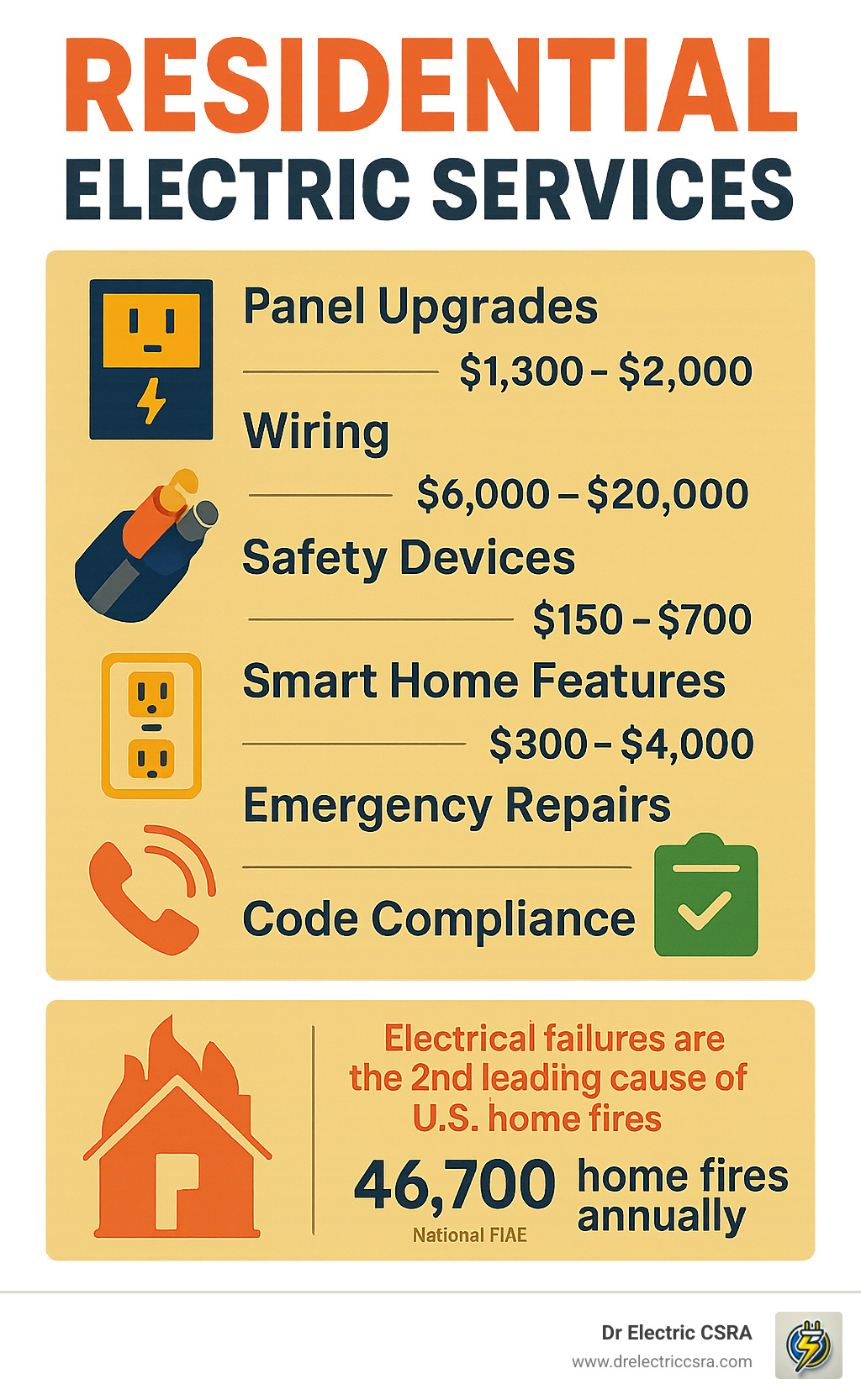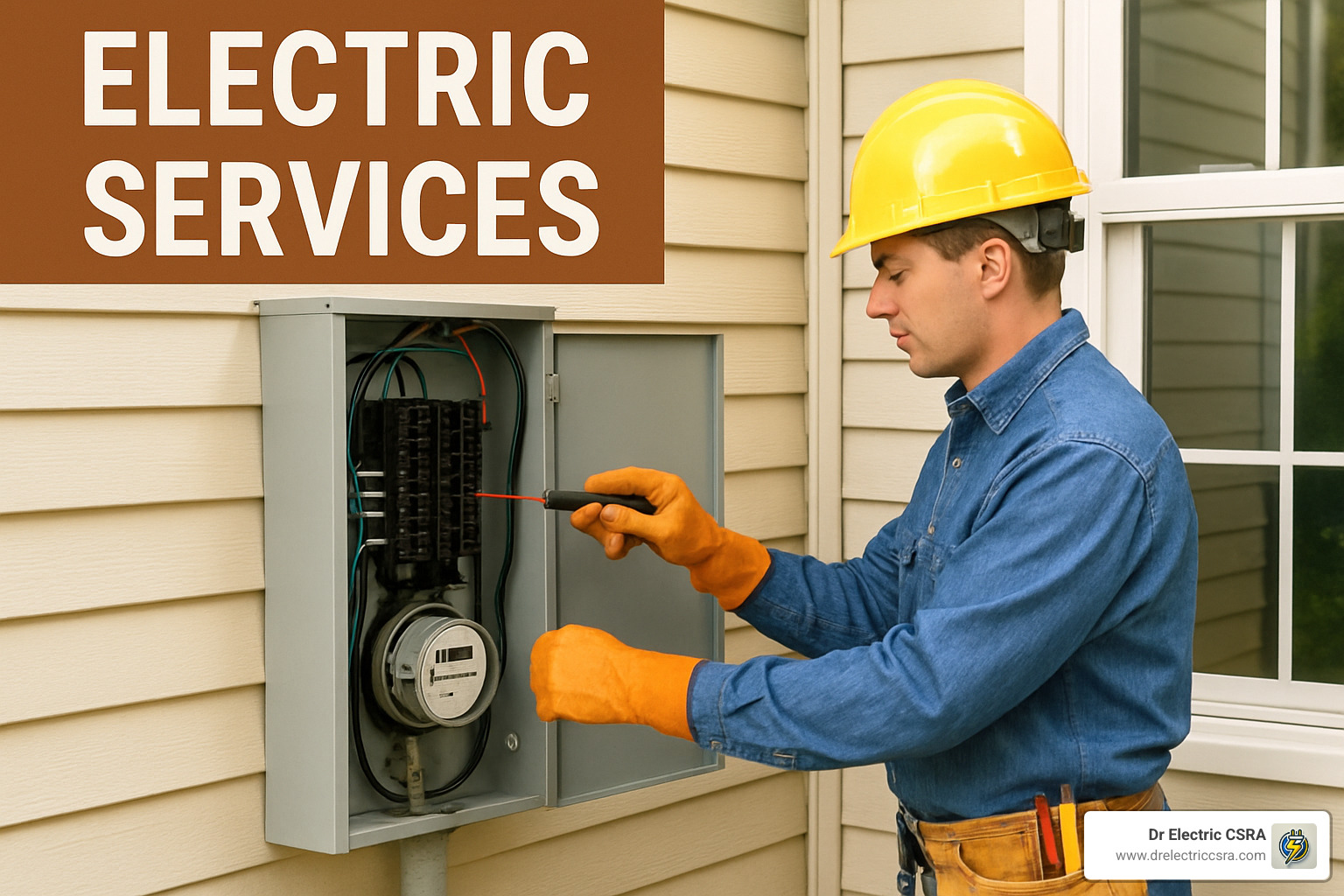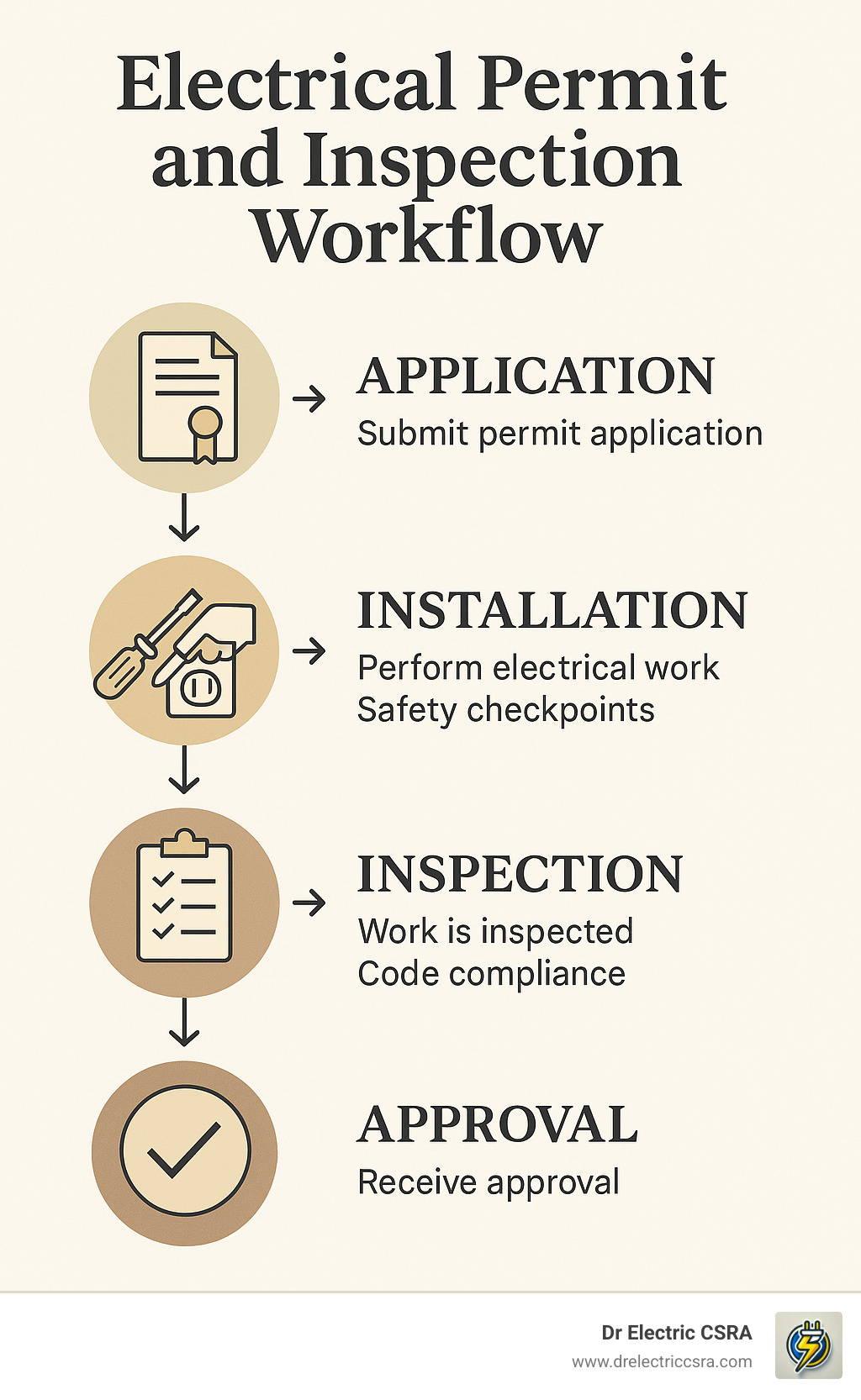Why Your Home’s Electrical System Is Your Most Critical Infrastructure
Residential electric services are the backbone of modern living, yet most homeowners only think about their electrical system when something goes wrong. From powering your morning coffee maker to keeping your family safe with smoke detectors, every aspect of your daily routine depends on reliable electrical infrastructure.
Here’s what residential electric services typically include:
- Panel upgrades and electrical service increases
- Whole-house rewiring and grounding systems
- GFCI and AFCI protection installation
- Surge protection and backup generators
- Smart home automation and LED retrofits
- EV charger installation and solar-ready circuits
- Emergency repairs and 24/7 troubleshooting
- Code compliance inspections and permits
The stakes couldn’t be higher. According to the National Fire Protection Association, electrical failures or malfunctions are the second leading cause of U.S. home fires, accounting for an estimated 46,700 home fires each year. Many older homes weren’t designed for today’s electrical demands – from AC units to electric vehicle chargers – making upgrades not just convenient, but essential for safety.
Georgia’s severe weather patterns create significant challenges for homeowners. Power surges from lightning strikes can destroy thousands of dollars in electronics, while aging electrical panels struggle to handle modern appliances safely.
The temptation to tackle electrical work yourself is understandable, especially with rising service costs. But as one industry expert puts it: “Unless you are simply swapping a light bulb or plugging in a surge protector, hiring a licensed electrician is in your best interest.” The risks – from insurance claim denials to code violations – far outweigh any short-term savings.
I’m Jesse Burnett, Master Electrician and founder of Dr. Electric CSRA, with over 1,200 completed jobs spanning residential electric services from basic repairs to complex smart home installations. My team has seen how proper electrical work protects families while poor installations create dangerous, costly problems down the road.

Basic residential electric services terms:
– 24 hr electrical services
– electrical repairing services
– electrical wiring services
What Are Residential Electric Services?
Residential electric services encompass everything that keeps your home’s lights on and your family safe. It starts with your distribution panel – that metal box full of breakers – and extends to every outlet, switch, and light fixture in your home.
Modern homes are like mini power plants, juggling everything from your grandmother’s old toaster to your brand-new electric car charger. That’s a lot of demand on wiring that might have been installed decades ago.
Your electrical system has to be smart enough to know when something’s wrong. It needs to shut down power instantly if there’s a ground fault in your bathroom or an arc fault that could spark a fire. This is where professional residential electric services become absolutely critical.
According to ongoing Scientific research on electrical fire causes, damaged or overloaded electrical systems remain a leading cause of house fires. We’ve walked into too many homes where well-meaning DIY projects created hidden dangers lurking behind walls. These problems can go undetected for years before something goes wrong.
Licensed Residential Electric Services: Why It Matters
When you call Dr. Electric CSRA, you’re getting licensed electricians who understand the legal side of electrical work. Licensed professionals pull the proper permits for electrical work, ensuring every installation gets inspected and meets National Electrical Code (NEC) requirements.
Here’s what matters to homeowners: your insurance company cares about licensing. If there’s ever a fire traced back to unpermitted electrical work, your claim could be denied. Code violations can also kill home sales or force expensive corrections.
Most importantly, licensed electricians know how to keep you alive. We understand grounding, load calculations, and safety protocols that prevent electrocution and fires.
Key Differences Between Utility Supply & In-Home Services
Your utility company owns everything up to and including your meter. Everything from your main electrical panel inward is your territory – that’s where residential electric services take over.
This distinction becomes important when problems arise. If your whole street goes dark, call the utility company. But if your neighbor’s lights are on while half your house is dark, you need residential electrical services.
Core Residential Electric Services Roundup
When I started Dr. Electric CSRA over a decade ago, residential electric services were pretty straightforward. Today’s electrical work includes EV chargers, smart home systems, and whole-house surge protection that would have seemed like science fiction back then.
Every week, we respond to calls that could have been prevented with proper electrical infrastructure. Understanding these core services helps you stay ahead of problems instead of reacting to them.
Electrical Panel Upgrades & Sub-Panels

Your electrical panel is the traffic controller for your home’s power. Most panels in older homes are trying to direct modern traffic with 1970s technology. We regularly see homes where the original 100-amp service is trying to power central air, electric water heaters, multiple big-screen TVs, and maybe an electric car charger.
All electrical panels must be UL approved, but that doesn’t mean your current panel can handle what you’re asking it to do. Load calculations determine exactly how much power your home needs and whether your current setup can deliver it safely.
Sub-panels solve many problems without requiring complete electrical overhauls. They let us add circuits where you need them most without overloading your main system. We install them during kitchen remodels or when adding workshops, pool equipment, or EV charging stations.
More info about upgrade services covers the technical details.
Whole-House Rewiring & Grounding
Knob-and-tube wiring from the 1940s lacks proper grounding and was never designed for modern electrical loads. Aluminum wiring from the 1960s and 70s expands and contracts when heated, loosening connections over time. Loose connections create resistance, resistance creates heat, and heat starts fires.
Whole-house rewiring sounds disruptive, but we’ve gotten good at working around families’ schedules. We often tackle one room at a time, keeping the rest of your house powered while we work.
Modern grounding systems aren’t just code requirements – they’re your electrical system’s safety valve. When something goes wrong, grounding gives dangerous electricity a safe path instead of through your family.
More info about electrical grounding explains the technical details.
GFCI & AFCI Protection
GFCI outlets are those outlets with test and reset buttons in bathrooms and kitchens. They detect when electricity is going somewhere it shouldn’t and shut off power in milliseconds. They’re required in kitchens, bathrooms, garages, and outdoor areas.
AFCI protection prevents fires caused by electrical arcs. These devices are now required in bedrooms, living areas, and most habitable spaces.
Tamper-resistant outlets prevent kids from sticking things into electrical outlets while allowing normal plugs to work perfectly.
Whole-House Surge Protection & Generators
Whole-house surge protection installs at your main panel and stops voltage spikes before they reach your home’s wiring. This protects everything from your HVAC system to your garage door opener.
In Georgia’s storm-heavy climate, surge protection is essential. We’ve responded to calls after thunderstorms where lightning destroyed tens of thousands of dollars in electronics and appliances.
More info about surge protection covers technical details.
Backup generators require proper installation with transfer switches that prevent back-feeding electricity into utility lines. We size generators based on essential systems – refrigeration, heating/cooling, lighting, and some outlets.
More info about installing transfer switch covers technical requirements.
Smart Home, LED Retrofits & Energy Savers

Smart home technology has reached the point where it actually makes life easier. Smart switches and outlets let you control lighting and appliances from your phone while automating energy-saving behaviors.
LED lighting retrofits provide immediate energy savings and dramatically longer bulb life while using 75% less energy than traditional bulbs.
Motion sensors and programmable timers reduce wasted electricity in garages, basements, and closets. They pay for themselves in energy savings within the first year.
EV Chargers & Solar-Ready Circuits
Electric vehicle charging is the fastest-growing segment of residential electric services. Level 2 home chargers require dedicated 240-volt circuits and often necessitate electrical panel upgrades.
We approach EV charger installations with future needs in mind. Many families start with one electric vehicle but end up with two within a few years.
Tax incentives and utility rebates are available for many EV charger installations with specific requirements for equipment and installation methods.
More info about car charger installation provides detailed information.
Solar-ready circuits prepare your home for renewable energy installations, including necessary disconnect switches and electrical connections. Adding them during other electrical work saves money compared to retrofitting later.
Warning Signs & 24/7 Emergency Help

Your home’s electrical system usually gives warning signs before serious problems occur. Learning to recognize these signals can save you thousands in repairs and protect your family from dangerous situations.
Flickering lights are often your first clue that connections are coming loose. Loose connections create heat, and heat can start fires. If lights flicker when you turn on major appliances, your electrical system might be struggling to handle the load.
Hot outlets or switch plates are serious red flags. Heat indicates dangerous electrical resistance that can lead to fires. If you notice a burning smell that seems electrical, don’t ignore it – that’s often melting wire insulation.
Frequent breaker trips are your electrical system protecting itself from overloads. One trip might be normal, but if the same breaker keeps tripping, there’s an underlying problem. Never “fix” this by installing a larger breaker.
Storm damage creates unique challenges in Georgia. Even if power returns after severe weather, hidden damage can cause problems weeks later.
More info about electrical repair covers common problems and solutions.
When to Call for Residential Electric Services ASAP
Sparks from outlets or switches indicate dangerous electrical arcing that can ignite materials instantly. Buzzing or humming sounds from your electrical panel suggest failing components. Partial power loss often indicates serious problems with your main panel.
Any situation involving smoke from electrical devices requires immediate action. Water and electricity create deadly combinations that require professional evaluation.
We provide 24/7 emergency residential electric services because electrical problems don’t wait for business hours.
Costs, Codes & Hiring Tips
Permits are your friend. They ensure your work gets proper oversight and prevent code violations during home sales. Licensed electricians handle permit paperwork and know local requirements.
Electrical work costs vary dramatically based on complexity. Simple outlet replacement might run under $200, while rewiring could cost $8,000 to $15,000 or more. Key factors include labor complexity, materials, accessibility, and permit fees.
| DIY vs Professional Comparison |
|---|
| DIY Risks: Code violations, insurance claim denials, safety hazards, expensive fixes later |
| Professional Benefits: Code compliance, insurance protection, proper permits, warranties, safety |
Budgeting for Residential Electric Services
Panel upgrades typically run $1,500 to $3,000. GFCI outlet installation costs $150 to $300 per outlet. Whole-house surge protection ranges from $300 to $800. These are investments in your home’s safety and value.
Energy-efficient upgrades often pay for themselves through lower utility bills. Many utilities offer rebates for these upgrades.
Home EV Charger vs Public Charging shows how home charging systems often pay for themselves.
How Electricians Keep Work Code-Compliant
Professional electricians follow systematic processes ensuring every installation meets safety standards. We use only UL-listed devices and materials. Load calculation sheets ensure your system can safely handle connected devices.

Documentation protects your investment with detailed installation records, warranties, and inspection certificates. Questions to ask when hiring include licensing, insurance, permits, warranties, and code compliance guarantees.
Frequently Asked Questions about Residential Electric Services
Let’s tackle the most common questions we hear from homeowners about residential electric services. After completing over 1,200 electrical jobs throughout the CSRA, these are the concerns that come up again and again in our service calls.
What should I do if my breaker keeps tripping?
When a breaker keeps tripping, it’s actually doing its job – protecting your home from electrical fires. Your first step should be identifying what’s connected to that circuit and reducing the electrical load. Unplug devices, turn off lights, and see if the problem stops.
If the breaker continues tripping even with minimal load, you’re dealing with a wiring problem that needs professional attention. This could be anything from a loose connection creating dangerous arcing to damaged wire insulation causing ground faults.
Never try to “fix” the problem by installing a higher-amperage breaker. That’s like removing the smoke detector batteries because the alarm keeps going off – you’re eliminating the safety device instead of addressing the real problem. We’ve seen this dangerous shortcut cause house fires.
Safety comes first every time. If you smell burning odors, see sparks, or notice hot outlets or switches along with the tripping breaker, shut off power at your main panel and call us immediately. These signs indicate serious electrical hazards that can escalate quickly.
How often should I schedule an electrical inspection?
Most homes benefit from electrical inspections every 3-5 years, but older homes need more frequent attention. If your house was built before 1990, consider biennial inspections since electrical codes and safety standards have evolved dramatically over the decades.
Major life events often trigger the need for electrical inspections too. Before buying or selling a home, professional electrical evaluations can identify problems before they become expensive surprises. Planning a kitchen renovation or adding an electric vehicle charger? An inspection ensures your current system can handle the additional electrical demands.
Don’t wait for your scheduled inspection if warning signs appear. Flickering lights, frequent breaker trips, burning odors, or outlets that work intermittently all signal immediate inspection needs. We’ve found that catching electrical problems early almost always costs less than waiting until they cause damage or safety hazards.
Do I need whole-house surge protection if I already use power strips?
Absolutely yes – and here’s why power strips alone aren’t enough protection. Those individual surge protectors only shield devices plugged directly into them, leaving your hard-wired appliances, HVAC system, and built-in electronics completely vulnerable to voltage spikes.
Whole-house surge protection installs at your main electrical panel and blocks voltage surges before they enter your home’s wiring system. This comprehensive approach protects everything electrical in your house, not just the few items you’ve plugged into surge strips.
Georgia’s frequent thunderstorms make whole-house protection especially critical. We’ve responded to calls where lightning strikes destroyed air conditioning units, water heaters, and kitchen appliances worth thousands of dollars – none of which could be protected by plug-in surge strips.
Think of it this way: power strips are like umbrellas that only cover one person, while whole-house surge protection is like a roof that shields your entire home. Both have their place, but comprehensive protection requires the whole-house approach for complete peace of mind.
Conclusion
When the lights go out at 2 AM or you smell something burning from your electrical panel, you realize how critical your home’s electrical system really is. Residential electric services aren’t just about convenience – they’re about keeping your family safe and your life running smoothly.
We’ve seen too many close calls over the years. Homeowners who ignored flickering lights until sparks started flying. Families who tried DIY electrical work only to create fire hazards. People who waited until their electrical panel failed completely.
That’s why we built Dr. Electric CSRA around 24/7 reliability and uncompromising safety standards. Our licensed team has handled over 1,200 electrical projects throughout Augusta, Evans, Grovetown, Martinez, Aiken, and North Augusta, from simple repairs to complete smart home installations.
Energy efficiency isn’t just good for the environment – it’s good for your wallet. The LED retrofits, smart switches, and high-efficiency systems we install often pay for themselves through reduced utility bills.
We’re your one-stop solution for everything electrical. Emergency repair? We’re there. Kitchen remodel requiring new circuits? We handle permits and inspections. Electric vehicle charger or generator? We design systems that grow with your needs.
Don’t let electrical problems become emergencies. Whether you’re dealing with an aging system, planning upgrades, or want professional inspection peace of mind, we’re here to help.
Contact Dr. Electric CSRA today for residential electric services that put your family’s safety first. More info about emergency services – because electrical emergencies don’t keep business hours, and neither do we.






0 Comments